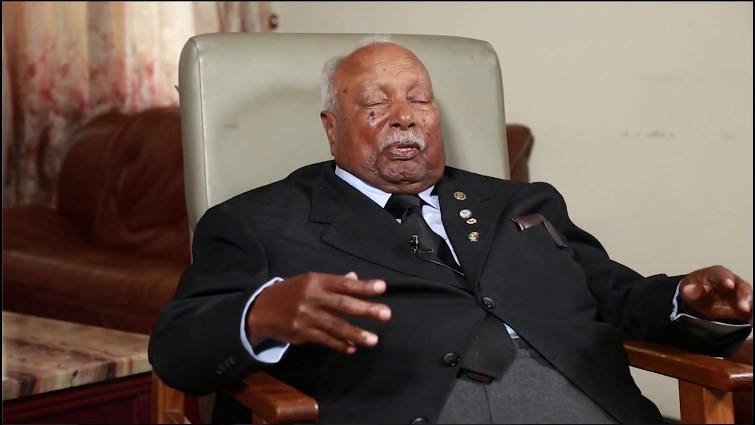Girma’s Political Career

Girma Wolde-Giorgis, a figure who navigated the turbulent waters of Ethiopian politics for decades, left a lasting mark on the nation’s political landscape. His journey, from early involvement in the Ethiopian political scene to his role as President, offers insights into the complexities of Ethiopian governance.
Early Involvement in Ethiopian Politics
Girma’s political journey began during the tumultuous years leading up to the 1974 revolution. He joined the Ethiopian People’s Revolutionary Party (EPRP), a Marxist-Leninist organization, which emerged as a significant force challenging the Derg regime. This early involvement exposed him to the intricacies of political movements and the struggle for power.
Role in the Ethiopian People’s Revolutionary Democratic Front (EPRDF)
Following the collapse of the Derg regime, Girma became a founding member of the Ethiopian People’s Revolutionary Democratic Front (EPRDF), a coalition of four regional parties that eventually came to dominate Ethiopian politics. His role within the EPRDF involved leading the Southern Ethiopian People’s Democratic Movement (SEPDM), one of the coalition’s constituent parties. This period saw him play a pivotal role in shaping the EPRDF’s policies and consolidating its power.
Presidency of Ethiopia (2001-2018)
Girma’s political career reached its zenith when he was elected President of Ethiopia in 2001. As President, he served as the head of state, representing Ethiopia on the international stage. During his tenure, he focused on promoting economic development and maintaining stability within the country. He also played a crucial role in fostering regional cooperation and promoting Ethiopia’s interests on the African continent.
Legacy and Impact on Ethiopian Politics
Girma’s presidency was marked by a period of relative stability and economic growth. His leadership contributed to Ethiopia’s emergence as a regional power and its growing influence on the international stage. However, his presidency was also criticized for its lack of political reforms and the suppression of dissent.
Despite the criticisms, Girma’s legacy remains complex and multifaceted. He is remembered as a skilled politician who navigated the challenges of Ethiopian politics during a period of significant change. His contributions to the nation’s development and his role in shaping the EPRDF’s policies continue to be debated, but his impact on Ethiopian politics is undeniable.
Ethiopia’s Socioeconomic Landscape During Girma’s Presidency: Ethiopia Girma

Girma Wolde-Giorgis’s presidency, from 2001 to 2018, witnessed a period of significant socioeconomic transformation in Ethiopia. While the country faced various challenges, it also achieved notable progress in several areas. This section delves into the complexities of Ethiopia’s socioeconomic landscape during Girma’s tenure, examining both the positive strides and the persistent obstacles.
Economic Growth and Development
Ethiopia’s economic performance during Girma’s presidency was characterized by sustained growth, driven primarily by agricultural expansion, infrastructure development, and a burgeoning service sector. The country’s GDP consistently grew at an average rate of around 10% per year, making it one of the fastest-growing economies in the world. This impressive growth was fueled by government investments in infrastructure, including roads, railways, and hydropower projects, which facilitated trade and economic activity.
“Ethiopia’s economic growth was fueled by government investments in infrastructure, including roads, railways, and hydropower projects, which facilitated trade and economic activity.”
The agricultural sector, which employs a significant portion of the population, also saw substantial improvements. Increased investment in irrigation, improved farming techniques, and the expansion of land under cultivation contributed to higher agricultural productivity.
“Ethiopia’s agricultural sector saw substantial improvements, with increased investment in irrigation, improved farming techniques, and the expansion of land under cultivation contributing to higher agricultural productivity.”
However, despite the impressive growth figures, Ethiopia’s economy remained heavily reliant on agriculture, which was vulnerable to climate shocks and fluctuations in global commodity prices. The manufacturing sector remained underdeveloped, and the country faced challenges in diversifying its economy and creating high-skilled jobs.
Social Changes and Advancements, Ethiopia girma
Girma’s presidency saw notable progress in social development indicators, particularly in education and health. The government implemented policies aimed at expanding access to education, resulting in a significant increase in primary school enrollment.
“The government implemented policies aimed at expanding access to education, resulting in a significant increase in primary school enrollment.”
The government also made strides in improving healthcare infrastructure and access to basic healthcare services, leading to a decline in infant and maternal mortality rates.
“The government also made strides in improving healthcare infrastructure and access to basic healthcare services, leading to a decline in infant and maternal mortality rates.”
However, despite these achievements, Ethiopia continued to face significant challenges in addressing poverty, inequality, and social disparities.
“Ethiopia continued to face significant challenges in addressing poverty, inequality, and social disparities.”
The country’s rapid population growth, coupled with limited economic opportunities, contributed to high unemployment rates, particularly among young people. The government also faced criticism for its handling of ethnic tensions and political dissent, which further exacerbated social divisions.
Challenges Faced During Girma’s Presidency
Ethiopia’s socioeconomic progress during Girma’s presidency was not without its challenges. The country faced several significant hurdles, including:
- Political Instability and Conflict: Ethiopia experienced a series of internal conflicts, including the Oromo protests and the war in Tigray, which destabilized the country and hindered economic development.
- Poverty and Inequality: Despite economic growth, poverty remained a persistent issue, with a large portion of the population living below the poverty line. Inequality also remained a significant challenge, with wealth concentrated in the hands of a small elite.
- Climate Change: Ethiopia is highly vulnerable to the impacts of climate change, with recurring droughts and floods posing a significant threat to agriculture and food security.
- Limited Access to Basic Services: Despite progress in education and healthcare, many Ethiopians lacked access to basic services such as electricity, clean water, and sanitation.
- Corruption and Governance: Corruption remained a pervasive issue, undermining good governance and hindering economic development. The government faced criticism for its lack of transparency and accountability.
Key Statistics on Ethiopia’s Socioeconomic Progress During Girma’s Presidency
| Indicator | 2001 | 2018 |
|---|---|---|
| GDP Growth Rate (%) | 5.4 | 10.1 |
| Poverty Rate (%) | 39.6 | 23.9 |
| Primary School Enrollment Rate (%) | 63.2 | 87.9 |
| Infant Mortality Rate (per 1,000 live births) | 98 | 45 |
| Maternal Mortality Rate (per 100,000 live births) | 670 | 350 |
Girma’s International Relations and Diplomacy

Girma Wolde-Giorgis’s presidency marked a pivotal period in Ethiopia’s foreign policy, characterized by a strong emphasis on regional integration, conflict resolution, and economic diplomacy. He played a significant role in shaping Ethiopia’s international relations, navigating complex regional dynamics, and promoting the country’s interests on the global stage.
Key Diplomatic Achievements
Girma’s diplomatic efforts during his presidency yielded notable achievements, solidifying Ethiopia’s position as a key player in regional and global affairs.
- Strengthened Relations with Neighboring Countries: Girma actively pursued closer ties with Ethiopia’s neighbors, fostering cooperation and resolving long-standing border disputes. This included resolving the border dispute with Eritrea, a significant achievement that contributed to regional stability.
- Promoted Regional Integration: Girma played a crucial role in advancing regional integration initiatives, particularly within the Intergovernmental Authority on Development (IGAD). He championed collaborative efforts to address shared challenges such as drought, poverty, and conflict.
- Enhanced International Cooperation: Girma’s presidency saw Ethiopia’s active engagement with international organizations, including the United Nations and the African Union. He emphasized multilateral cooperation to address global issues such as climate change, poverty reduction, and peacebuilding.
Girma’s Approach to Regional Conflicts and International Cooperation
Girma adopted a proactive approach to regional conflicts, often serving as a mediator and peacemaker. His efforts contributed to the resolution of several conflicts in the Horn of Africa, demonstrating his commitment to promoting peace and stability in the region.
- Mediation Efforts: Girma’s role as a mediator in regional conflicts was crucial. He actively engaged in peace negotiations and facilitated dialogue between warring factions. His efforts contributed to the resolution of several conflicts, including the border dispute with Eritrea and the conflict in Somalia.
- International Cooperation: Girma emphasized the importance of international cooperation in addressing regional conflicts and promoting sustainable development. He actively sought partnerships with international organizations and countries to support peacebuilding efforts and development initiatives.
Girma’s Interactions with Prominent International Leaders
Girma’s presidency saw him engage with numerous prominent international leaders, fostering bilateral relations and advancing Ethiopia’s interests on the global stage.
| International Leader | Country | Nature of Interaction | Key Outcome |
|---|---|---|---|
| Barack Obama | United States | Official Visit | Strengthened bilateral relations, discussed issues of mutual interest. |
| Ban Ki-moon | United Nations | Official Meeting | Enhanced cooperation on peacebuilding and development initiatives. |
| Nelson Mandela | South Africa | Official Visit | Shared perspectives on peace, reconciliation, and democracy. |
| Angela Merkel | Germany | Official Visit | Discussed economic cooperation and development assistance. |
Ethiopia Girma, known for his powerful vocals and dynamic stage presence, has a deep connection to the rich history of music in his homeland. This connection is echoed in his admiration for the architectural legacy of Quincy Hall, quincy hall , a landmark that embodies the spirit of community and cultural expression.
Girma sees this shared spirit as a source of inspiration, fueling his desire to create music that resonates with audiences across generations.
Ethiopia’s Girma is a name synonymous with athletic prowess, particularly in the demanding world of steeplechase. His legacy is etched in the memories of fans who witnessed his daring runs and the iconic moment he fell during a race, a fall captured in the article girma steeplechase fall.
Despite the fall, Girma’s dedication and spirit have continued to inspire generations of Ethiopian athletes, proving that even in the face of adversity, true grit can triumph.